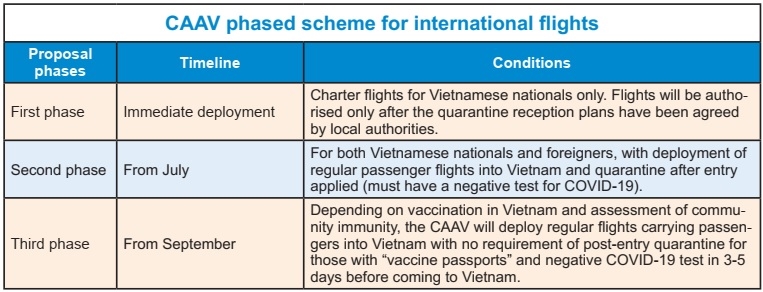Autumn bloom forecast for reopening of Vietnam’s skies
 |
The scheme was submitted by the Civil Aviation Authority of Vietnam (CAAV) last week to the Ministry of Transport, eliciting colourful responses.
Hong Sun, vice chairman of the Korea Chamber of Business in Vietnam, told VIR, “This is good news for South Korean businesses in particular. Many have been planning to expand to and in Vietnam. And now they can realise these with the resumption of flights.”
Initial flights will be operated to certain markets between Vietnam and Japan; those between Vietnam and South Korea, and others with Taiwan with frequency of four flights a week each way for airlines of each side.
In this period, the total number of weekly flights with passengers entering Vietnam from Japan, South Korea, and Taiwan is expected to be 24 with 6-7,000 passengers in quarantine each week.
The resumption of international flights is expected to be more widely deployed from September with the application of “vaccine passports”. The market for deployment will be countries/territories that announce the acceptance of the efficacy of COVID-19 vaccines of the same kind widely used in Vietnam. The initial frequency is expected to be seven one-way flights per week on each route for the airlines of each party.
Before July, there will be charter combo flights for Vietnamese nationals, which the CAAV has proposed for deployment immediately. In the wake of this, Vietnamese air carriers have announced plans for international flights. Bamboo Airways will operate six flights a week to London Heathrow from the start of May. The airline has also been licensed to fly directly to the United States by the US Department of Transport from the final quarter of this year.
Elsewhere, national flag carrier Vietnam Airlines said on March 31 that it will operate four international routes from now until the end of June – namely Hanoi-Narita, Hanoi-Incheon, Hanoi- Sydney, and Ho Chi Minh City-Sydney.
Virginia B. Foote, chairwoman of the American Chamber of Commerce in Vietnam said, “It is our hope that better systems can be established for our executives and technical support teams to enter the country. Safety is the priority, but we wish to work on more predictable procedures to make re-entry possible for our personnel. In addition, as new investors look at Vietnam, they need to be able to send personnel to examine and negotiate with their counterparts here.”
European and British businesses are also expecting the same, especially in the context that the EU-Vietnam Free Trade Agreement (FTA) is bringing great business opportunities for the EU bloc and Vietnam, and the signing of the UK-Vietnam FTA is essential continuity to the close bilateral trading relationship.
The British Chamber of Commerce in Vietnam recommended prioritising the establishment of safe travel “bubbles” or “air corridors” with regional financial centres that are important to Vietnam, while the Japanese Chamber of Commerce and Industry in Vietnam proposed that the government considers special measures for the entry of short-term engineers and businesspeople entering Vietnam.
What the stars mean:
★ Poor ★ ★ Promising ★★★ Good ★★★★ Very good ★★★★★ Exceptional
Related Contents
Latest News
More News
- Vietnamese businesses diversify amid global trade shifts (February 03, 2026 | 17:18)
- Consumer finance sector posts sharp profit growth (February 03, 2026 | 13:05)
- Vietnam and US to launch sixth trade negotiation round (January 30, 2026 | 15:19)
- NAB Innovation Centre underscores Vietnam’s appeal for tech investment (January 30, 2026 | 11:16)
- Vietnam moves towards market-based fuel management with E10 rollout (January 30, 2026 | 11:10)
- Vietnam startup funding enters a period of capital reset (January 30, 2026 | 11:06)
- Vietnam strengthens public debt management with World Bank and IMF (January 30, 2026 | 11:00)
- PM inspects APEC 2027 project progress in An Giang province (January 29, 2026 | 09:00)
- Vietnam among the world’s top 15 trading nations (January 28, 2026 | 17:12)
- Vietnam accelerates preparations for arbitration centre linked to new financial hub (January 28, 2026 | 17:09)

 Tag:
Tag:



















 Mobile Version
Mobile Version